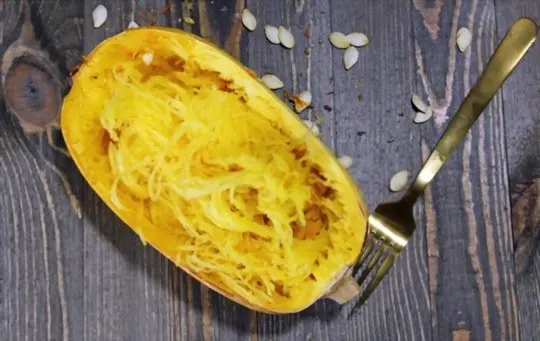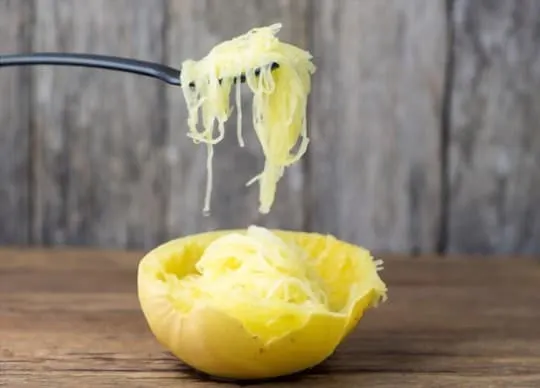Spaghetti squash consists of a group or set of cultivars from the Cucurbita Pepo.
They come in an array of colours, shapes, and sizes.
Some of the colours include orange, ivory, and yellow, where the orange one features the most carotene content.
You will find numerous large seeds in its centre. The flesh of the spaghetti squash in its raw form looks similar to a raw squash.
The fruit’s meat falls off from its flesh when you cook it. It falls away like strands or ribbons that make it look like actual spaghetti.
It is also usable as an alternative to spaghetti, and you can bake, boil, steam, or microwave it.
Plus, it contains multiple nutrients such as beta carotene, folic acid, vitamin A, and potassium.
The spaghetti squash originates from China, and it also goes by the name of “Vegetable Spaghetti” and “Noodle Squash.
” You can try delicious recipes such as the “Roasted Spaghetti Squash,” “Butternut Squash Noodles,” or the “Spaghetti Squash Carbonara”.
Can you freeze spaghetti squash? Yes, it is very much possible for you to freeze your spaghetti squash.
You may want to freeze them for later use from leftovers, or you could also make them in bulk and keep them for future use.
Does Freezing Affect Spaghetti Squash?

Freezing your spaghetti is very tricky compared to other edibles because of how it is cut and stored inside the freezer.
You can expect its quality to deteriorate, but the taste will still be there.
You will have a hard time trying to thaw and cook this vegetable/fruit.
When you try to thaw it, you would want the strands or noodles to retain their original form.
But once it goes inside the freezer and goes into a solid mode, it is difficult to revert back.
Yes, you will be able to thaw it, but the main challenges lie in preserving the quality.
However, regardless of what the situation comes to, many people choose to freeze it for future use.
Why? Well, because the flavours still remain intact despite the long freezing periods.
Also, there are certain thawing methods that make the process so much easier.
How To Freeze Spaghetti Squash?

We will be compiling the steps for you to freeze your spaghetti squash.
They are as follows:
- Choose a firm spaghetti squash and start rinsing it.
- Proceed to place it on the cutting board.
- Start slicing your spaghetti squash using a sharp knife in half lengthwise.
- Now you need to use a metal spoon for scraping out all its seeds. You can either choose to roast and eat the seeds or discard them.
- Start laying down the halves of the squash flat on the baking sheet.
- Put the squash inside a preheated oven and start to cook them until its flesh becomes tender.
- Proceed to insert a knife or fork in your squash to see if it is cooked. Do it at the squash’s centre. You will know that it’s cooked properly if you can easily pull it back.
- Now you need to wear the oven mitts for removing the squash and baking sheet.
- Allow your spaghetti squash to cool down for you to handle.
- Start dragging the fork’s tines across its flesh in a lengthwise manner. The flesh will start pulling away into strands, which appear like noodles.
- Take out a big bowl and put a colander over it.
- Begin scooping the strands into the colander.
- Proceed to put both the bowl and colander into the fridge overnight. It is for draining away all the moisture from your spaghetti squash.
- Ensure that you remove all the moisture before freezing it, preventing the squash from getting soggy whenever you choose to reheat it.
- Take out the colander from your freezer and start scooping the squash inside the freezer bags. You can divide the spaghetti squash into multiple freezer bags. In this way, you can use small amounts and thaw quicker.
- Ensure that you are pressing out all the air from the freezer bags prior to sealing them. If you have air in them, then they will end up getting spoiled.
- Lastly, you need to start labelling your bags with the freezing date and what’s on the inside. If you have multiple bags, then proceed to stack them for saving space and proper arrangement.
Frozen spaghetti squash tends to last for about 8 months inside the freezer.
However, when you take care of it properly, it can even go for a year or more.
But spaghetti squash in the fridge tends to have a lower shelf-life, so it’s smarter to freeze it.
How To Thaw Frozen Spaghetti Squash?

You can thaw your frozen spaghetti squash using four methods:
- Take out the frozen spaghetti squash from the freezer and put it in the fridge. Ensure that you leave it overnight and use them the next day.
- You can also put the frozen spaghetti squash inside the microwave. The heat will defrost it, but you need to stick with a proper temperature.
- Another method would be to keep your frozen spaghetti squash on the kitchen counter. Allow the room temperature to do its trick and bring it to its original form. But you will require more patience with this method.
- Lastly, you can place them in a bowl of warm water. The shift in temperature will unfreeze your frozen spaghetti squash.
Caution.
- Do not use a high volume of heat in your microwave.
- Place a plate or bowl for collecting the condensation on your kitchen counter.
- If you are putting back half of the spaghetti squash into the freezer, then avoid letting air inside the freezer bag or container.
Conclusion
Spaghetti Squash is a super-healthy alternative to the actual spaghetti, noodles, or pasta.
You can cook and eat this healthy meal, along with some tasty sauce and another garnishing.
When you buy a spaghetti squash, ensure that it’s completely blemish-free.
It features many health benefits, such as bettering colon health, managing your weight, or reducing the risks of cancer.
Also, freezing your spaghetti squash won’t end up affecting its nutritional values.
However, you need to avoid steaming or cooking your squash too long as it will become mushy.

Can You Freeze Spaghetti Squash? A Complete Guide
Ingredients
- Spaghetti squash
- Air-tight containers or Ziplock bags
- Labels and markers
Instructions
- Prepare all the mentioned equipment and ingredients in the article.
- Follow the steps for proper freezing.
- Label the container with the date and contents.
- Depending on the recipe, thawing time may vary.
